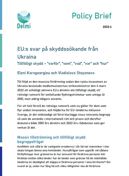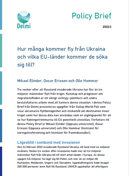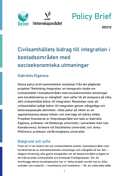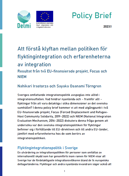The study focuses on key areas such as housing, employment, self-sufficiency, healthcare, and education, and how these have been impacted by the legal framework of the Temporary Protection Directive. It underscores the uncertainty and challenges associated with temporary protection while also highlighting the participants' initiative and adaptability.
Key Conclusions and Recommendations:
- Registration and Bank-ID: Implement registration and the possibility of Bank-ID for displaced Ukrainians to facilitate their integration into Swedish society.
- Long-term Stay: Develop long-term solutions for those fleeing war in Ukraine after the Temporary Protection Directive expires, such as residence permits for work or study.
- Education and Employment: Ensure access to Swedish language courses (SFI) and targeted labor market initiatives to facilitate sustainable integration and reduce the risk of being locked into low-skilled jobs.
- Support for Civil Society: Continue supporting civil society and the Ukrainian diaspora, which play a crucial role in easing the integration of asylum seekers.
- Dialogue and Flexibility: Promote continuous dialogue with displaced persons to better understand and meet their needs in an uncertain future.
The study provides important insights for policymakers and emphasizes the need to adapt and improve reception and integration policies in Sweden to address the specific challenges faced by displaced Ukrainians.
About the authors:
Oksana Shmulyar Gréen and Svitlana Odynets are researchers at the Department of Sociology and Work Science at University of Gothenburg.
The Policy Brief was published in Augusti 2024.
Photography: Max Kukurudziak via Unsplash.




